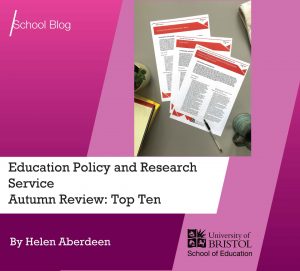 Blog by Helen Aberdeen, Director, Education Policy and Research Service, School of Education, University of Bristol
Blog by Helen Aberdeen, Director, Education Policy and Research Service, School of Education, University of Bristol
A Happy New Year to all in education – let’s hope it is a more settled year than 2021! As Director of the Education Policy and Research Service (formerly DSS), producing monthly summaries of key policy and research, I have had something of a bird’s eye view of the educational landscape over the last year – think of me as a seagull eyeing up passing ships and attempting to swoop when something tempting comes into view.
So, let’s have a look at the most popular summaries downloaded by fellow educational seagulls (aka our subscribers) last term – we’ll refer to them as the ‘Top Ten.’ Some of these reports and more are available to view in our samples webpage.
I admit to being totally biased (i.e., very proud of colleagues whose reports made it into the Top Ten downloads) and I make no apology about starting with these. One was a report by Dr Frances Giampapa exploring how to encourage researchful practices in early years settings – a neglected area to date. The other was a report by my colleague Simon Brownhill and his team – an insightful case study of an EAL learner in the UK.
Ofsted took the top 2 spots last term with their research review reports in history and music. Hardly surprising that COVID-19 related reports came next. In third place was a report from the National Foundation for Educational Research which shone a spotlight on the impact of school closures – a lot of interesting if rather depressing detail, but also some glimmers of a silver lining to the dark COVID-19 cloud in terms of enhanced practices and technological advances. The other COVID-19-related report came from the Parliamentary Office of Science and Technology which periodically publishes useful briefings on educational issues. It summarises evidence about the mental health and wellbeing of children under 18 before and during the pandemic and discusses recent policy approaches to protecting and improving children’s mental health.
Two reports from the Education Endowment Foundation (EEF) feature in the Top Ten. One is a new guidance report on effective professional development – a helpful tool for evaluating schools’ CPD provision. It sets out 3 key recommendations; I love the way it compares professional development to toothpaste! The other EEF report is the updated guide to the Pupil Premium, setting out a 4 step strategy which school leaders can use to develop an evidence-based approach to their Pupil Premium strategy – something which is now required on the new reporting template.
The DfE always features in the Top Ten – this time with the publication of the 2021-26 National Strategy for Autism which was my first summary for this academic year. The strategy sets out a vision for what the government wants autistic people and their families’ lives to be like in 2026 across 6 priority areas. It also makes a range of funding commitments for 2021-2.
Another ‘big hitter’ in our Top Ten lists is the Education Policy Institute which produced a comprehensive evidence review of social and emotional learning. A timely report as we become aware of the impact of COVID-19 on children’s mental health and wellbeing.
I do hope that my blogging today has given you a sense of the wide range of topics which we cover! If you already have access to the service, l hope that you will have been prompted to engage with the summaries and the weekly emails. For those of you involved in Teacher Education or professional development, remember the EPRS toolkit which was updated in summer 2021 with the aim of enabling you to use the summaries for training purposes. If you are reading this and are not yet a subscriber, I hope that you will have been prompted to check out the service for yourself and consider joining the subscriber community! https://edn.bris.ac.uk/eprs/about
Helen Aberdeen
Director, Education Policy and Research Service, School of Education, University of Bristol
